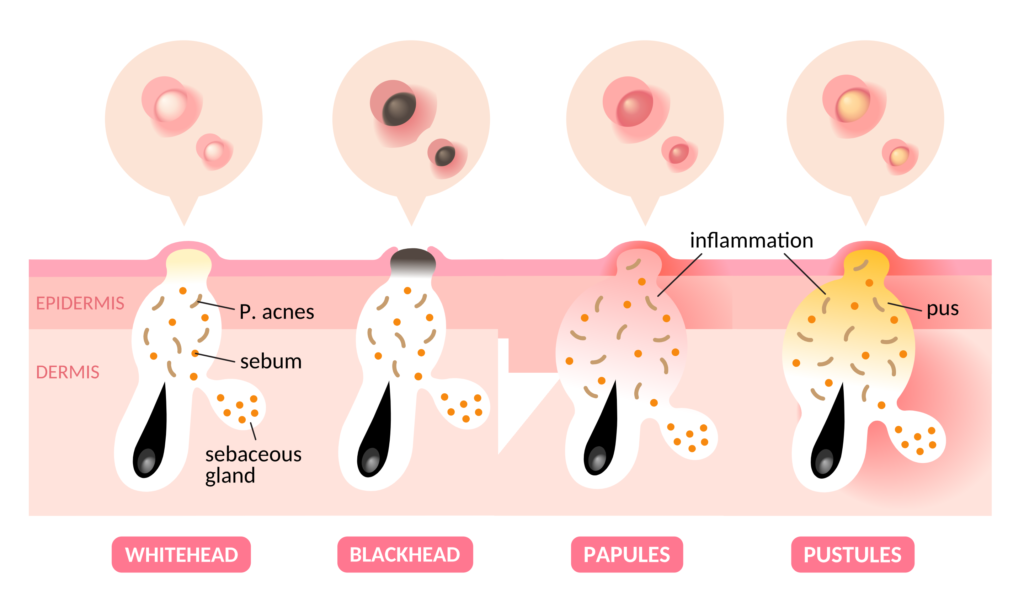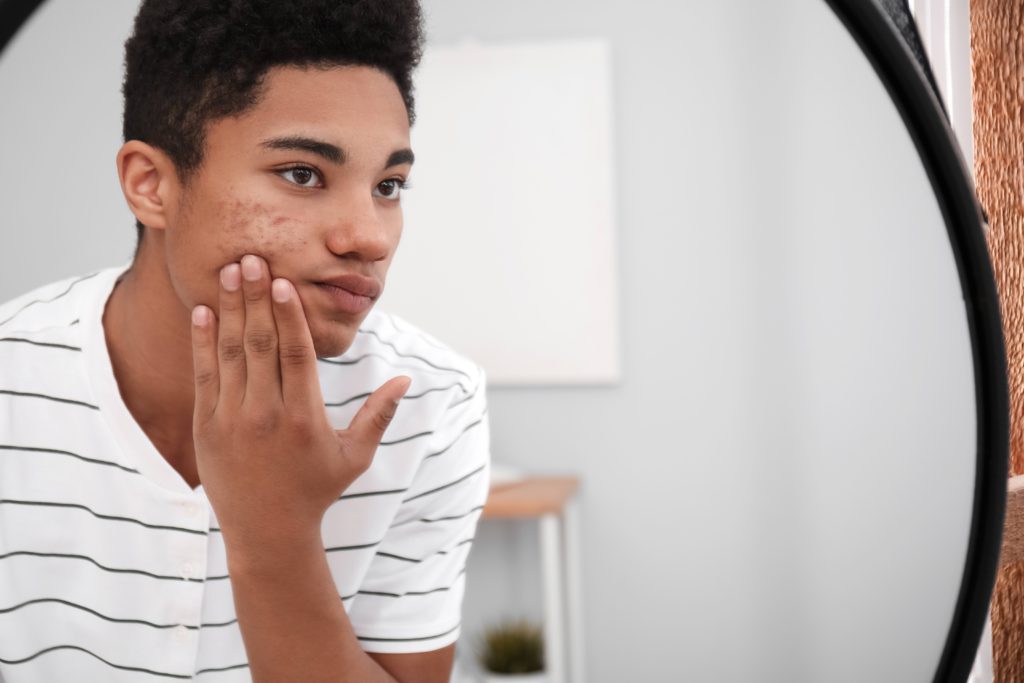Acne, breakouts, pimples, blackheads. We’ve all experienced them at some point in our lives, and while acne is most commonly associated with the teenage years, it remains an ever-present skin care concern for adults. But what exactly is acne? What causes it and how can you prevent or minimize its occurrence? And, when a breakout occurs, what can you do to treat it?
What causes acne?
Acne is a skin condition that occurs when hair follicles become clogged with oil and dead skin cells. The common visible result is whiteheads, blackheads, pustules (pimples), and papules. Excess oil (known as sebum) is one of the main factors that causes acne.
During puberty, the hormonal changes experienced by our bodies cause the sebaceous glands to enlarge and make more sebum. This is a big reason why acne and puberty are so closely linked. Women can also experience acne that coincides with menstruation or during menopause.
- Whiteheads develop when pores are plugged, but closed to the outside air.
- Blackheads develop when pores are plugged, but are open to the outside air.
- Papules develop when blocked hair follicles are inflamed but do not contain pus.
- Pustules (Pimples) develop when blocked hair follicles become inflamed or infected with bacteria and pus develops.

What should I do to prevent acne?
You may not be able to prevent all instances of acne, but there are some basic things that you can start doing today to take care of your skin and reduce your incidents of acne.
First, you should wash your face twice a day using a gentle cleanser. Wet your face, and then with your hands gently massage the cleanser onto your face using a circular motion. Do not use a washcloth. Rinse thoroughly, then pat dry.
When picking a cleanser, you want to use products that are non-comedogenic, and are free of added fragrances, sulfates, parabens, and other harsh chemicals.
Second, you should use a moisturizer daily. Again, you want to use a product that is non-comedogenic, and is free of added fragrances, sulfates, parabens, and other harsh chemicals. When your skin is too dry, your body starts producing more oil (sebum) to keep your skin hydrated, and excess oil is one of the main factors that causes acne.

What should I use to treat acne?
There are a number of ingredients/agents that are typically used in acne care products. Let’s take a deeper look into what these chemicals do.
Benzoyl Peroxide – An agent that peels away dead skin cells, excessive oil, and bacteria. This tends to dry out your skin and cause itching and general irritation after applying. If you have sensitive skin, you may want to avoid using benzoyl peroxide, as the side effects tend to be more prevalent. Benzoyl Peroxide works really well as a quick-fix to dry up acne and get rid of the extra oil (sebum) that causes acne to emerge.
Glycolic Acid – An agent that exfoliates your skin while retaining moisture. It sheds the dead skin cells from the top layer of your skin and promotes the growth of new skin. Glycolic acid is an alpha hydroxy acid and has been found to have antibacterial and antioxidant properties. This antibacterial property kills the bacteria often found in pimples. Glycolic Acid is great because it exfoliates your skin, helps your skin retain moisture, and kills bacteria that may be growing inside your pores.
Salicylic Acid – An agent that exfoliates your skin and helps to unclog pores. Additionally, salicylic acid has anti-inflammatory and antimicrobial properties, which helps to control the inflammation caused by pimples. Salicylic acid is important because it cleans out any of the bacteria left behind by other agents and reduces inflammation.
What’s next?
Wash your face twice a day with a gentle cleanser that is non-comedogenic and doesn’t contain additives. Moisturize your skin daily – if you don’t, your body will produce more oil, which can lead to acne.
If you have questions or specific skin care concerns, you should speak to a skin care expert that can help develop a treatment plan that works for you.
References
- https://www.mayoclinic.org/diseases-conditions/acne/symptoms-causes/syc-20368047
- https://www.healthline.com/health/benzoyl-peroxide-for-acne
- https://www.medicalnewstoday.com/articles/best-antioxidant-serums#:~:text=Summary-,Antioxidants%20protect%20the%20skin%20and%20other%20cells%20by%20fighting%20free,applying%20it%20to%20the%20face.
- https://www.healthline.com/health/beauty-skin-care/glycolic-acid-for-acne#how-to-use
- https://www.healthline.com/health/beauty-skin-care/glycolic-acid-vs-salicylic-acid#about-salicylic-acid
- https://www.healthline.com/health/skin/acne
- https://my.clevelandclinic.org/health/diseases/22905-acne-papules
How Can We Help?
Legal and Privacy
Quick Contacts
- (630) 884-4449
- Questions@mirror.care
-
Mirror Care Pharmacy 17W535 Butterfield Rd Suite 001
Oakbrook Terrace, IL 60181
Receive Updates from Mirror Care
- Copyright 2026 Self Therapeutics, LLC


Leave a Reply